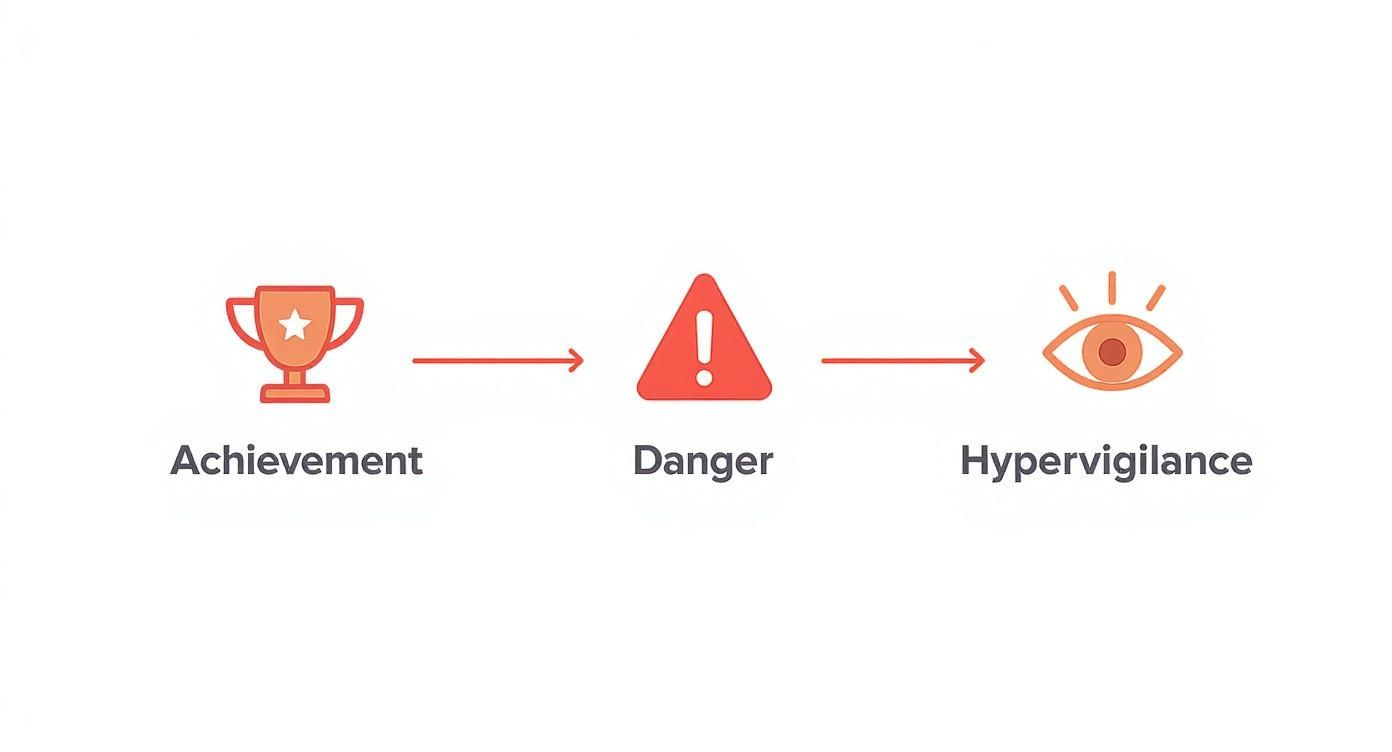Beyond Executive Burnout...
Lead With Power, Not Exhaustion
For High-Achieving Women Who
Refuse to Choose Between Success and Sanity
Take The Assessment That 97% Never Finish. Join The Uncommon Few Who Actually Face The Truth About Their Exhaustion
Get Instant Access: To Your Personal Results in 10 Minutes Start Now
(Take Your Self-Audit)
Dear Beautiful Soul,
I see you.
Not just your achievements or your carefully curated LinkedIn profile.
I see the woman behind the titles, beyond the metrics, beneath the mask of "having it all together."
I see you at 3AM, when the world is quiet but your mind isn't.
When the questions you can't ask in the boardroom become too loud to ignore.
"Why does achieving everything I wanted feel like losing myself?"
"When did success start feeling this heavy?"
I know this journey intimately.
Not because I'm another coach with strategies and systems (though yes, those matter).
But because I've walked alongside women who dared to question everything they built.
Like Lorraine, who found herself in the darkest place imaginable both personally and professionally.
Today, she's not just surviving; she's reaching heights she "didn't even realize she was looking for."
Her words, not mine:
"What Baz does is life altering. He reached my heart, my soul, and allowed me to come alive again."
Or Angela, who transformed her relationship with power entirely.
She stopped pushing through exhaustion and started leading from authentic presence.
Now her team doesn't just respect her they're inspired by her whole, unfiltered truth.
Then there's Sabrina, who discovered what happens when you stop trying to fit into old leadership models.
"Baz doesn't just offer advice," she shares, "he ignites a fire within. He empowers you to unlock unprecedented potential not just in yourself, but in your entire organization."
This isn't just about executive burnout or stress management.
Those are just symptoms of a deeper truth.
This is about reclaiming your soul in the midst of success.
About remembering who you were before the world told you who to be.
About leading from a place of power that doesn't require perfection.
I've watched women step into boardrooms not with rehearsed speeches, but with unshakeable presence.
I've seen them make million-dollar decisions from a place of inner knowing, not endless analysis.
I've witnessed them build global teams while staying deeply connected to themselves.
Your success got you here.
But your truth will take you further.
You don't need another strategy.
You need permission to lead differently.
To breathe differently.
To succeed differently.
To be differently.
The transformation you're seeking isn't about adding more to your already full plate.
It's about coming home to the woman you've always been beneath the achievements.
Ready to remember who you are beyond the titles?
With deep understanding and unwavering belief in your next chapter,
Baz
P.S. The fact that you're still reading means your soul knows something your schedule hasn't admitted yet.
It's time for real change.
Not the kind that looks good on paper, but the kind that feels true in your bones.

Private Mentorship
When Success Can't Wait
- 8 weeks of direct access transformation
- Custom power reclamation strategy
- Weekly breakthrough sessions
- Emergency support when you need it most
- End burnout without sacrificing success
- Make decisions from power, not pressure
- Lead from authentic presence, not performance
- Create sustainable, legacy-level impact
Million Dreams Community
Where High-Achieving Women Transform Together
- Weekly hot seat calls with direct solutions
- Immediate executive strategy planning
- Elite peer accountability
- Direct access to proven frameworks
- Reclaim 10+ hours weekly
- Transform your energy in 30 days
- Build unshakeable leadership presence
- Create impact without exhaustion










Hi I'm Baz...

I know what it's like to look successful on the outside while falling apart on the inside.
My journey from British military veteran to rock bottom taught me the hardest truth, sometimes you have to lose everything to find yourself.
After my own dark night of the soul battling depression, facing homelessness, and questioning everything I discovered something powerful.
Real transformation isn't about pushing harder. It's about coming home to yourself.
Today, I guide high-achieving women from exhaustion to embodied leadership. Featured in Yahoo, CEO Weekly, Women Leaders Magazine, and Digital Journal, my work goes beyond traditional coaching.
Not because I have all the answers, but because I understand the questions that keep you up at 3AM.
This isn't about adding more strategies to your life. It's about remembering who you were before the world told you who to be.
Ready to come home to yourself?
TAKE YOUR FIRST STEP
Begin With The Private Reset Ritual
Join hundreds of female executives who started their transformation here.
No pressure. No performance. Just presence.
(Start sleeping better in 5 days or less)

How to Overcome Imposter Syndrome at Work: A High-Achiever’s Guide
It’s the silent collapse no one else sees. You’ve just landed a massive client or received a stellar performance review. But instead of pride or relief, a cold dread washes over you. A voice whispers,“If they only knew. When will they discover I’m not as smart as they think?”This isn’t just humility; it’s a gut-wrenching certainty that you are a fraud.
This feeling has a name imposter syndrome but giving it a label doesn't begin to capture the visceral reality of the experience. It lives in your body. It's the racing heart before you speak up in a board meeting, the compulsive need to re-read an email for the tenth time, and that hollow pit in your stomach when praise just doesn't land. You write off your successes as luck, timing, or the result of working twice as hard as everyone else.
"If I stop performing, if I make one mistake, I’ll disappear. They’ll finally see the real, incompetent me."
This isn't some simple mindset problem you can fix with a few positive affirmations. It’s a predictable nervous system response, hardwired from sustained pressure and high stakes. For so many high-achieving women, the brain’s threat detection system becomes hyper-vigilant, flagging visibility and success as potential dangers. You aren’t broken or insecure; your internal alarm system is just stuck in overdrive. Getting this is the first real step in learninghow to overcome imposter syndrome at work.
The Hidden Pattern: The Neuroscience of Feeling Not Good Enough
That persistent, sinking feeling that you’re not good enough isn't a personal failing or some simple lack of confidence. It’s a biological response, hardwired deep into your nervous system. To really get a handle on imposter syndrome at work, we have to look under the hood at the wiring that creates this feeling in the first place.
Your brain has one primary job: keep you alive. It’s constantly scanning your environment for threats through a process called neuroception, and this happens automatically, way below the level of conscious thought. When it picks up on a threat whether that’s an actual tiger in the bushes or just the fear of being judged in a boardroom it kicks off a powerful, primitive response.
The part of your brain running this show is the amygdala, your internal smoke detector. For high-achievers, the relentless pressure, high stakes, and constant demand for perfection can actually train the amygdala to see success itself as a threat. Think about it: visibility, praise, and new responsibilities become danger signals because they represent a higher risk of failure and exposure.
The Perfectionist's Treadmill
It’s like being stuck on a "Perfectionist's Treadmill." You hit a goal, which brings more visibility. Your amygdala immediately flags this visibility as a potential danger what if you mess up next time? This triggers a cascade of stress hormones like cortisol and adrenaline, throwing your nervous system into a state of high alert. You feel anxious, on edge, and find yourself compulsively over-preparing for the next thing just to prevent the perceived "danger" of being found out.
This isn't a failure of mindset; it's your body's survival system working exactly as designed, just on the wrong target. Your nervous system is trying to protect you from a threat that doesn't actually exist.
This physiological state is what makes the feeling of being a fraud so visceral and real. The racing heart, the tight chest, the inability to ever truly relax these aren't just "in your head." They are tangible, physical signals from a dysregulated nervous system screaming, "Danger!"
Your Vagus Nerve and the Path to Safety
So, how do you get off this treadmill? The key is understanding the vagus nerve. This is the main pathway of your parasympathetic nervous system, which acts as your body’s natural braking system. When your vagus nerve is toned and active, it sends signals of safety and calm back to your brain, effectively telling the amygdala to stand down.
When you're caught in the imposter syndrome loop, you are living in a state of sympathetic activation the classic fight-or-flight response. Your vagus nerve is essentially offline. The goal isn't to eliminate fear, but to learn how to consciously activate this nerve to bring your body back to a state of calm and regulation, even when the pressure is on.
Sympathetic State (Threat Response):This is where imposter syndrome lives and breathes. Your heart rate is up, your breathing is shallow, and your focus narrows to see only potential mistakes and failures.
Parasympathetic State (Safety Response):When you activate your vagus nerve, you shift into this state. Your heart rate slows, you can think more clearly, and you regain access to your creativity and problem-solving skills.
This biological reality is why simple affirmations often fall flat. You can'tthinkyour way out of a physiological threat response; you have to signal safety to yourbodyfirst. Despite achieving incredible success, many women remain trapped in this cycle. A notable study found that 43% of young women aged 18 to 29 frequently doubt their professional abilities, compared to just 36% of young men, showing how deeply this pattern can take hold. You can discover more insights about the gender gap in professional self-doubt from the American Survey Center.
By understanding the neuroscience, you shift the blame from yourself to your biology. You can stop asking, "What's wrong with me?" and start asking, "How can I regulate my nervous system?" This is the foundation for lasting change and the first real step toward embodied confidence. The work isn't about becoming fearless; it's about learning to feel the fear without letting it hijack your entire system.
The RAMS Reframe: A Practical Framework for Reclaiming Your Authority
Understanding the neuroscience is one thing, but knowing isn't doing. This is where we shift from theory to tangible action. To really dismantle imposter syndrome at work, you need a framework a set of practices that tells your body you’re safe and starts rewiring your brain’s knee-jerk reaction to success.
I call this the RAMS™ Method. This isn't about slapping on a brave face or chanting positive affirmations. It's a direct, embodied approach I've developed specifically for high-achieving women to reclaim their authority from the inside out. RAMS stands for Results, Attitude, Mastery, and Systems. Each pillar builds on the next, creating a rock-solid foundation of self-trust that’s grounded in evidence, not fleeting feelings.
Results: Rewiring Your Brain with Hard Evidence
When you’re caught in an imposter cycle, your feelings of inadequacy are screaming so loud you can’t hear the facts. The first move is to stop using your emotional state as a barometer for your competence. Instead, you need to rely on objective, irrefutable proof.
This is where you create what I call a Fact File. This isn't just a feel-good list of your wins; it's a meticulously curated dossier of your accomplishments, big and small. Think of it as an external hard drive for your achievements that you can plug in when your internal system is glitching.
Your Fact File should be stacked with proof:
Quantitative Metrics: Cold, hard numbers that prove your impact. Did you boost efficiency by15%? Did you spearhead a project that brought in $2M in revenue? Did you grow your team from five to fifty?
Qualitative Praise: Screenshots are your best friend here. Grab positive feedback from clients, emails from senior leaders singing your praises, or even that supportive Slack message from a colleague.
Project Outcomes: A quick rundown of tough projects you’ve nailed. Jot down the initial problem, the moves you made, and the successful result.
Skills Acquired: Every new piece of software you’ve mastered, every certification you’ve earned, every complex negotiation you’ve navigated it all goes in.
The real magic happens when you review this file regularly, especially before a high-stakes meeting or when you feel that familiar dread start to creep in. It interrupts the negative self-talk with undeniable proof, making it nearly impossible for your brain to dismiss your own capabilities. The constant over-preparation, for instance, is often directly tied to the struggle of overcoming perfectionism and embracing your authentic self. It's a vicious cycle.
Attitude: Regulating Your Nervous System
Let's be clear: you cannot think your way out of a physiological threat response. The "Attitude" component of RAMS is about learning to speak your nervous system's language. Before a big presentation, your body is often already bracing for impact. Your job is to manually downshift it from high-alert back into a state of safety and resourcefulness.
Here are two dead-simple, science-backed techniques to regulate your nervous system on the spot:
Physiological Sigh:This is a powerhouse for calming your system fast. Inhale deeply through your nose. At the very top of that breath, take in one more short sip of air. Then, let it all out with a long, slow exhale through your mouth. Do this two or three times. It instantly offloads carbon dioxide and sends a direct signal to your vagus nerve that you are safe.
Orienting:Slowly look around the room. Intentionally name five objects you see: "whiteboard," "blue chair," "window." This simple act yanks your brain out of the abstract death spiral of "what if" and grounds it in the physical reality ofright now. It tells your amygdala there's no saber-toothed tiger in the conference room.
These aren’t fluffy "just calm down" platitudes. They are direct biological interventions that shift you out of a fight-or-flight state and into a rest-and-digest state, where your brilliant, executive brain can actually come back online.
This process flow chart illustrates the vicious cycle of the Perfectionist's Treadmill, where achievement triggers a danger response and hypervigilance.

Regulating your nervous system with these techniques is how you physically step off this treadmill and break the cycle before it even starts.
Mastery: Redefining Growth and Feedback
Imposter syndrome whispers the lie that you must be a flawless, omniscient expert before you can feel worthy. The "Mastery" pillar systematically dismantles this by reframing skill development as a continuous, messy journey not a prerequisite for your value. It’s about embracing the identity of a learner.
A huge piece of this is learning to take feedback without it triggering a full-blown shame spiral. When you internalize constructive criticism, your nervous system reads it as a social threat, lighting up the same pathways as physical pain. The secret is to de-personalize it.
Try this script the next time you receive feedback:
"Thank you for sharing that. To make sure I understand, you’re suggesting that for the next report, I should [repeat the specific, actionable advice]. Is that correct?"
This simple response does three powerful things:
It buys you a precious moment to breathe and regulate your immediate emotional reaction.
It forces the feedback into a concrete, behavioral instruction instead of a vague judgment on your character.
It positions you as a proactive, collaborative partner in your own development.
Mastery isn't about knowing it all. It’s about having the resilience to keep learning, especially when it’s uncomfortable. It’s the quiet confidence that you can handle not knowing and that you have what it takes to figure it out.
Systems: Creating Structures for Sanity
Finally, you cannot out-will a broken system. If your work environment constantly rewards hypervigilance and overwork, your nervous system will stay on high alert, making imposter syndrome a foregone conclusion. The "Systems" pillar is all about building external structures that reduce your internal need for constant self-monitoring.
Think of it as building scaffolding around yourself so you don't have to carry the entire weight of your role alone.
Key systems to put in place include:
Effective Delegation: This is more than just offloading tasks. It’s about clearly defining outcomes, granting real autonomy, and setting up check-in points. This builds trust and frees up the mental bandwidth you're wasting on micromanaging.
Firm Boundaries: Learning to say "no" is a critical skill. A powerful phrase is, "I can't take that on right now, but I can [offer an alternative solution/timeline]." It protects your energy without making you unhelpful.
Structured Communication: Establish clear protocols for project updates. This cuts down on the ambiguity that fuels anxiety and the constant need to check in just to make sure nothing is on fire.
When you implement these systems, you create an environment of psychological safety. You lower the stakes. You build a container strong enough to hold the pressure so your nervous system doesn't have to. The RAMS method isn't a one-time fix; it's a repeatable process for moving from a place of fear to one of embodied authority. If you’re serious about overcoming imposter syndrome, you have to address all four of these areas.
The Return: Rewiring Your Identity as a Leader
Real, lasting confidence isn’t about just managing the symptoms of imposter syndrome it's about fundamentally rewiring how you see yourself as a leader. It's about embodying a new way of showing up. The RAMS framework gives you the tools, but applying them in those high-stakes moments at work is where the change truly happens.
This is the shift from intellectually knowing you're capable to viscerally feeling it in your bones, especially when the pressure is on. It’s not about "faking it 'til you make it." It’s about leading from a place of genuine, embodied confidence, not a place of fear.
From Imposter Thought to Confident Action
The voice of that inner critic loves to get loud right when you need to delegate, say no, or take credit for your work. These moments can feel like pop quizzes where your entire competence is being graded. Using pre-planned conversational scripts, grounded in the RAMS framework, gives you a pathway to act from authority instead of anxiety.
Think of these as ready-to-go responses that short-circuit your brain's initial panic button. They provide a track to run on until the new, more confident response becomes second nature.
Here’s a look at how to reframe those nagging imposter thoughts into powerful, confident actions.
Imposter Thought vs. Confident Response
Common Imposter Thought The Underlying Fear Confident Response (Action & Mindset) "If I delegate this, they'll mess it up, and it will reflect badly on me."
Fear of losing control and being seen as incompetent.
Action: Delegate the outcome, not theprocess.
Script: "The goal for this project is X. I trust your expertise to get us there. Let’s set a check-in for Wednesday to see what support you need." "I have to say yes to this request, or they'll think I'm not a team player."
Fear of rejection or being perceived as unhelpful.
Action: Protect your energy with a firm, helpful boundary.
Script: "My plate is full right now, but I can offer my input on the final draft next week.""Someone else on the team did most of the work. I can't take the credit."
Fear of being exposed as a fraud if you claim your contribution.
Action: Acknowledge the team while clearly stating your specific role.
Script: "It was a fantastic team effort. My role was to [state your specific contribution], which led to [positive result]."
These scripts aren't just about the words you say out loud. Each time you use one, you're reinforcing your identity as a capable leader who trusts her team, values her time, and owns her contributions. You're casting a vote for the leader you are becoming.
Leading from a Place of Embodied Confidence
This shift from fear to confidence isn’t just a mental game. For many of the high-achieving women I work with, imposter syndrome is deeply tangled with their core identity. A true breakthrough requires a fundamental shift in how you see yourself, which is the entire focus of our Identity Reset Intensive.
One client, a senior VP in tech, was a classic micromanager. She held the belief that if she wasn't involved in every single detail, the project would fail and her "incompetence" would be revealed. Applying the RAMS framework, she started small: delegating one low-stakes task with a clear outcome. When it got done successfully and without her constant oversight it provided a tiny crack of light. It was the first piece of evidence that her fear wasn't reality.
This is exactly how the change happens. It's not one big, dramatic event. It’s a series of small, intentional actions that build a new neural pathway one of trust and self-sovereignty.
Maintaining Authority with Authenticity
A common fear I hear from leaders is that if they stop over-preparing and being hyper-vigilant, their influence will vanish. The opposite is true.
Real authority comes from a regulated nervous system. When you are grounded and present, your team feels it. You project a calm confidence that invites trust far more effectively than frantic perfectionism ever could. You don’t have to be the loudest person in the room to have influence; you just have to be the most centered. And if you think you're alone in this, think again. A revealing Korn Ferry survey found that 71% of U.S. CEOs experience these feelings, proving that even those at the very top of their game are dealing with this.
Rewiring your identity as a leader means accepting that your value isn't tied to your constant state of alert. It’s about learning to lead from your authentic self, secure in the knowledge that you are enough exactly as you are.
Your First Step Toward Embodied Sovereignty
Let's bring all of this together. We've talked about the frameworks, the neuroscience, and the mental reframes and every single piece is critical. But real, lasting change doesn’t happen just in your head. Overcoming imposter syndrome isn't about thinking your way out of a feeling. It’s about regulating your nervous system back to a state of safety and biological self-trust. It's about embodiment.
This journey isn't about fixing some fundamental flaw, because there isn't one. It’s about returning to the capable, sovereign leader you already are, underneath the noise of a hyper-vigilant threat response. This requires small, consistent, physical actions that send a new message to your body: You are safe. You are capable. You belong here.
A Micro-Practice for Immediate Grounding
Before your next big meeting, that tough conversation, or any moment you feel that familiar dread creeping in, I want you to try this. It’s a simple, incredibly powerful practice you can do right at your desk in under 60 seconds to ground yourself and reclaim your physical space.
The "Feet on the Floor" Anchor:
Sit upright in your chair, moving away from the backrest. Plant both of your feet flat on the floor, about hip-width apart.
Close your eyes if that feels safe, or just soften your gaze toward the floor. Now, bring all of your attention to the soles of your feet.
Intentionally press your feet into the floor. Really feel the solid ground beneath you. Notice the texture of your shoes, the firmness of the floorboards, the undeniable connection between your body and the earth.
Take one slow, deep breath in through your nose,and then let it out with a long, audible sigh through your mouth. As you exhale, imagine any tension draining out of your body, down through your legs, and into the ground.
This tiny action yanks your brain out of its future-tripping anxiety loop and pulls it right back into the present moment. It's a direct, non-negotiable signal to your nervous system that you are physically supported and safe which is the absolute foundation of real confidence.
This small, embodied action is your first real step toward reclaiming your innate authority. It’s a physical declaration that you have a right to take up space and show up as the leader you were meant to be.
This practice is also fundamental for establishing stronger energetic boundaries. When you feel grounded in your own body, you're far less susceptible to the pressures and anxieties of others. To take this a step further, you can learn more about how to set effective boundaries at work and begin creating the external structures that support your internal calm.
Frequently Asked Questions
Let's cut right to the chase. Here are the real, unfiltered answers to the questions that are probably running through your mind. This is where we get practical and move past the theory.
Can Imposter Syndrome Ever Be Fully "Cured"?
Honestly, thinking about it as a "cure" is the wrong frame. It’s more about management and mastery. True, unshakeable confidence isn't the absence of self-doubt; it's the ability to feel that flicker of uncertainty and not let it hijack your entire system.
Frameworks like RAMS are designed to help you recognize the feeling the moment it shows up, so you can bring yourself back to a state of safety and authority in minutes, not days. The goal is to shrink the frequency and intensity of these episodes until they’re no longer running the show. Eventually, that old panic becomes a familiar, manageable signal instead of a tidal wave that wipes you out.
Is This Some Kind of Weakness, or Is It Real?
Let’s be crystal clear: imposter syndrome is not a character flaw. It's a sign that you care deeply about the quality of your work and your impact. It is an incredibly common psychological experience, especially for high-achievers who are constantly pushing into new territory.
And while you won't find it listed as a formal diagnosis in the DSM-5 (the clinical manual for mental disorders), it is absolutely recognized by professionals as a legitimate and exhausting pattern. Think of it as a predictable response to sustained pressure, not a personal failing.
You are not broken. You are a high performer whose internal threat-detection system has become way too sensitive to the pressures that come with success and visibility.
How on Earth Do I Talk to My Manager About This?
When you bring this up with your manager, avoid the "imposter syndrome" label. It can sound a bit vague and overly personal in a professional context. Instead, frame the conversation around specific behaviors and your desire for professional growth. This makes you sound proactive, not insecure.
Try shifting the language to something more concrete and actionable.
For instance, you could say:
"As I grow in this role, I'm focused on building more conviction in my project decisions. It would be incredibly helpful to get specific, concrete feedback from you on what went well after my next presentation."
"To help me really own my key projects, could we work together to define what success looks like with clearer metrics? Having that objective data is a game-changer for how I gauge my performance."
This approach immediately positions you as a self-aware, dedicated member of the team who is invested in tangible improvement. You’re not just sharing a feeling; you’re presenting an actionable plan, making it a thousand times easier for your manager to give you the specific, constructive support you actually need to thrive.
Are you ready to stop just managing the symptoms and start rewiring the root cause of imposter syndrome? At Baz Porter, we help high-achieving women like you move from a state of chronic self-doubt to one of embodied leadership and unwavering self-trust. Discover the framework that changes everything. Learn more about our approach.
© 2019 - 2025 | Baz Porter LLC. All rights reserved.
Protected by all the possible laws. If you wanna try and copy it. We are gonna come after you. Liam Neeson Style.
Terms Of Use | Privacy Policy | Disclaimer










